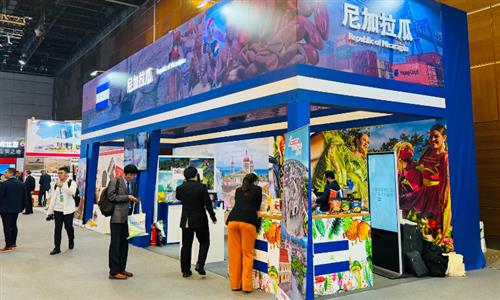Mercosur Summit highlights developing countries’ cohesion, challenging Western hegemony

Mercosur Photo:VCG
The 63rd Summit of Heads of State of Southern Common Market (Mercosur) and Associated States in Rio de Janeiro, Brazil this week once again showcased the cohesion and competitiveness of developing countries. The Mercosur was officially launched in 1995. The market covers a total population of around 300 million, stands as the world's eighth-largest economic framework.
As multipolarity continues to advance, Latin American countries, including members of Mercosur, are increasingly unwilling to be influenced by Western, especially the US, hegemony. Their confidence and determination to pursue fairer trade and a more independent and autonomous development path are becoming a significant factor in shaping the global landscape.
The development of Latin American countries has long been constrained by the dominance of the US dollar. In recent years, the US Federal Reserve's aggressive monetary policies have led to high inflation and high debt in many Latin American countries, and the importation of financial risks has significantly increased. The numerous disadvantages associated with relying on the US dollar have had a profound impact on these nations, prompting a mounting demand to decrease dependence on the US dollar in Latin American countries.
As early as 2008, Brazil and Argentina began using their own currencies for settlement of import and export trade, no longer using the US dollar as an intermediary currency. Earlier this year, the leaders of Brazil and Argentina expressed their intention to study the initiative of launching a common currency for South America. In June, the Central Bank of Argentina enabled the Chinese yuan deposits for local bank accounts. It also announced it will allow financial institutions to use the Chinese yuan as a currency for collecting deposits.
At this summit, all parties agreed to conduct research to further promote the use of local currencies for settlement throughout Mercosur. Using local currencies for settlement helps stabilize the economies of Mercosur member countries, promoting trade development and connectivity. This consensus has been reached in Latin American countries. Although there are challenges to achieving the use of local currencies for trade settlement within Mercosur, this summit has demonstrated Mercosur's determination to strengthen regional integration and reduce dependence on the US dollar.
For Latin American countries, the shadow of colonialism has constantly threatened their development since the Monroe Doctrine was announced 200 years ago. Breaking free from the hegemonic constraints of the US has become an ongoing development demand for the people of Latin America.
In addition to the US, the EU has also increased its attention on Mercosur over recent years in order to reduce its dependence on the Chinese market. For these Latin American countries, deepening cooperation with the EU can also provide important opportunities for them to integrate across the global value chain. However, when dealing with trade issues with the EU, Mercosur has also shown determination and decisiveness.
After 20 years of negotiations, Mercosur and the EU finally reached an agreement on the broad terms of a potential trade agreement in June 2019. However, in March, the EU demanded that products exported from Mercosur to meet EU environmental requirements, or risk facing sanctions. The EU's unilateral imposition of additional environmental conditions on the Mercosur-EU free trade agreement is a typical practice of trade protectionism. Environmental issues are just a pretext, the purpose of which is to protect the interests of agricultural producers and energy and mining companies within the EU, both of which are areas where Mercosur countries have a comparative advantage and are related to environmental issues. In response to this, Latin America firmly says "no."
Despite the importance of deepening ties between Mercosur and the EU in the context of international conflicts and uncertainties, the EU's approach of creating barriers is deemed "unacceptable."
Latin American countries have fully demonstrated their economic growth potential. On one hand, emerging markets in South America possess significant reserves of raw materials. Against the backdrop of the Ukraine crisis and the Israeli-Palestinian conflict, ensuring supply chain security has become a top priority globally.
On the opening day of the conference, Singapore signed a free trade agreement with the Mercosur, aiming to provide each other with broader market access through measures such as tariff reduction. On the same day, the EU announced its continued efforts to advance negotiations on a free trade agreement with Mercosur, with the goal of reaching a strategic agreement that aligns with the interests of both parties. This is because the EU hopes to reduce its dependence on Chinese minerals, and strengthening cooperation with resource-rich Latin America is crucial for its energy transition.
On the other hand, South-South cooperation is providing strong cohesion and discourse power. Last month, during Uruguayan President Luis Alberto Lacalle Pou's visit to China, the two sides signed over 20 agreements in the fields of trade and investment promotion. China has been Uruguay's largest trading partner and largest export market for 11 consecutive years. Strengthening economic and trade cooperation with China and enhancing the discourse power of Southern countries in global economic governance is a common strategic choice for Latin American countries.
With the current rise of the global South, they strongly express their determination to oppose hegemony and bullying. The history of colonization has made them fully aware that only by promoting industrial upgrading and breaking away from the role of raw material exporters can they earn equal development opportunities and integrate into the global system.
The author is professor with School of International Relations and Diplomacy, Beijing Foreign Studies University. bizopinion@globaltimes.com.cn



